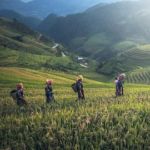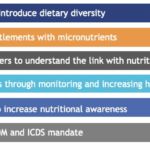Finding Value in Food Losses and Byproducts: Why Circular Agribusiness is Key to Sustainable Food Security in Africa
Food waste and spoilage are major problems in Africa. For example, between 25% and 44% of mangoes are lost across the value chain in Kenya. Likewise, the nutritious and edible fruits that grow along with the 10,000 metric tons of cashews Kenya produces are mostly discarded. And in Ethiopia, breweries dispose of more than 630,000 tons of spent grains per year, which can be used in animal feed or composted.
Post-harvest and post-production losses in these and other sectors generate tremendous waste along the entire length of these value chains – waste which has the potential to be brought back into the food system. Fortunately, that’s precisely what pioneering circular agribusiness entrepreneurs in East Africa are doing right now, by turning food waste and byproducts into affordable, nutritious foods and organic fertilisers.
The O-Farms program, Africa’s first accelerator focusing entirely on circular agribusiness, supports these front-running businesses and documents the immense potential for circular principles to contribute to sustainable food security in the region. Below, we’ll discuss the program and some of the businesses it supports, and explore the value of circular agribusiness in ensuring food security on the continent.
Accelerating Circular SMEs in Kenya and Uganda’s Food Value Chain
The O-Farms program supports 40 innovative small and medium enterprise (SMEs) in Kenya and Uganda. Funded by the IKEA Foundation and implemented by Bopinc and Village Capital, the project engages local entrepreneur support organisations (ESOs) to implement its SME accelerator activities. The Nairobi-based ESO E4Impact implements the O-Farms Accelerator in Kenya, while the ESO HiveColab runs the accelerator in neighbouring Uganda. O-Farms takes a longer view than many accelerators focused only on SMEs: By working through ESOs, the program will leave behind sustainable support networks that are crucial for bringing this nascent sector to maturity.
The O-Farms program groups SMEs into cohorts of 10, bringing these businesses together to progress through the accelerator activities. Anthony Kimani, Investment Services Manager for E4Impact, summarises the value of this approach: “A cohort-based accelerator for SMEs is effective for helping agribusinesses adopt sustainable practices and enhancing competitiveness through the creation of new products or increased resource efficiency. It also reduces the unit cost of business acceleration while maximising peer-to-peer learning. We hope similar programs can leverage this collaborative approach to realise system-level change towards a more circular agribusiness sector in East Africa.”
The Impact of Supporting Circular Agribusiness in Africa
O-Farms builds on the work of organisations like the Ellen MacArthur Foundation, Aceli Africa, the DOEN Foundation and others that are promoting the circular economy vision and supporting circular agribusinesses. The case for supporting these agribusinesses could not be more clear. By turning food waste into new nutritious products, these entrepreneurs create jobs and drive sustainable economic growth while reducing waste and contributing to food security.
For instance, in Kenya, Bioafriq Energy, an O-Farms participant, produces drying technologies for dehydrating fruits and vegetables that can’t be sold for retail. This helps cut post-harvest losses, and enables farmers to produce nutritious dried fruit and veggie snacks for local markets. Joka Farms Resources and Services, another participant in the O-Farms accelerator in Kenya, gets the most out of sugarcane by pressing juice and making organic fertiliser and animal feed from the leftover cane. The recent spike in prices for chemical-based fertilisers has driven up demand for the company’s sugarcane-based organic alternative. According to CEO Job Kanyi, “There’s a crisis of inorganic fertiliser prices, which have gone up. That’s helping us a lot, because desperate users have an alternative with us.” Noting that most chemical fertilisers are imported from Ukraine and Russia (and affected by the current war and associated economic sanctions), Kanyi says, “…our stock [of organic fertiliser] has sold out immediately.”
Supporting circular agribusiness’ efforts to scale
The SMEs in the O-Farms program are among the vanguard of circular agribusinesses in East Africa. They operate in agricultural sub-sectors identified by our research as having strong circular growth potential in the region. Other promising sectors include tree nuts – like cashews and coconuts – as well as cereals, coffee, dairy and even edible oils.
However, in spite of the tremendous potential for circularity in these sectors, and the initial successes of entrepreneurs, several factors constrain the growth of these circular SMEs. In East Africa, and most likely in other regions, among the most common growth inhibitors are insufficient consumer awareness of circular agribusiness, low levels of technological development among SMEs, limited access to financing and unsupportive public policy. To circumvent these challenges, the O-Farms accelerator program focuses on business model development, technical skills, investment readiness and networking with a community of investors and mentors, who work in and around the food system.
You can read more about these and other insights in the Scoping the Potential for Circular Agribusiness report series, which is available via the O-Farms project download page. In these reports, we call upon a wide range of stakeholders to consider circular agribusiness solutions – including investors, policymakers, agricultural trade organisations, wholesalers, researchers and others – because they all have a role to play. Find out how you and your organisation can play a part in supporting circular SMEs and making circularity a mainstream approach in East Africa: Contact Valéria Varga (o-farms@bopinc.org) or Brenda Wangari (info@vilcap.com), or visit our website for more information.
Brenda Wangari is a Senior Program Manager at Village Capital, and Patrick Guyer is an Impact Measurement & Insights Lead at Bopinc.
Photo: Job Kanyi of Joka Farms Resources and Services holds organic fertiliser made from sugarcane byproducts. Credit: Roald Klumpenaar/Bopinc.
- Categories
- Agriculture



